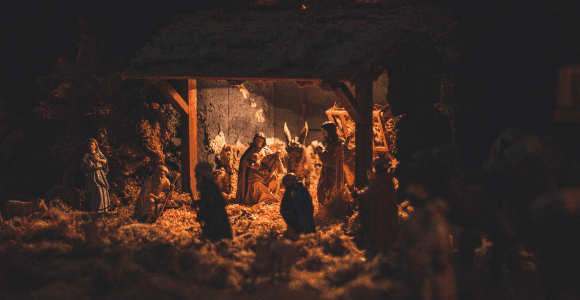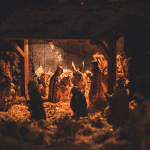
Our reading this last weekend of Advent is found in the gospel of Luke. It is the story of the angel’s visit to Mary:
In the sixth month of Elizabeth’s pregnancy, God sent the angel Gabriel to Nazareth, a town in Galilee, to a virgin pledged to be married to a man named Joseph, a descendant of David. The virgin’s name was Mary. The angel went to her and said, “Greetings, you who are highly favored! The Lord is with you.”
Welcome Readers! Please subscribe to Social Jesus Here.
Mary was greatly troubled at his words and wondered what kind of greeting this might be. But the angel said to her, “Do not be afraid, Mary; you have found favor with God. You will conceive and give birth to a son, and you are to call him Jesus. He will be great and will be called the Son of the Most High. The Lord God will give him the throne of his father David, and he will reign over Jacob’s descendants forever; his kingdom will never end.”
“How will this be,” Mary asked the angel, “since I am a virgin?”
The angel answered, “The Holy Spirit will come on you, and the power of the Most High will overshadow you. So the holy one to be born will be called the Son of God. Even Elizabeth your relative is going to have a child in her old age, and she who was said to be unable to conceive is in her sixth month. For no word from God will ever fail.”
“I am the Lord’s servant,” Mary answered. “May your word to me be fulfilled.” Then the angel left her. (Luke 1:26-38)
This is the only version of the Jesus story in our sacred canon where Jesus’ mother Mary is explicitly characterized as a “virgin.” Some translations hint at this status in Matthew, but here in Luke it is explicit. To wrap our heads around this narrative element, we need to first back up and look at the social context in which this story was originally written, and consider the larger themes of the gospel Luke for that audience. In our treatment of Rome this week, I’m deeply indebted to the work of Walter Brueggemann, specifically his book Tenacious Solidarity. If you would like to learn more about Rome’s system than we have space for this week, let me heartily suggest chapter 2 of that work.
In Rome’s economic system, money was extracted from the commoners and funneled into the various strata of the wealthy elite. This created a society in Judea where there was no middle class. The people were reduced to peasants who kept getting squeezed to become poorer, while the rich, wealthy elite continued to become richer. As Walter Brueggemann explains, systems of economic extraction are unsustainable. You can’t continue to squeeze the poor indefinitely. At some point the system breaks and we know that this system broke violently in the late 60s C.E. in Judea.
What we are reading this last weekend of Advent in Luke, happens while that overtaxation and economic predation was still going strong. The ruling elites of Jesus’ society (Herod, the priesthood, the scribes, the elders—the Temple State) were becoming wealthier and wealthier the more they complied with Rome’s extraction system. Through taxes, loans, and rents, the people became debtors, and then as debtors they were reduced to peasants. They lost their land through their inability to repay debts they’d incurred just to survive, and they became dependent on a system that continued to take from them. It was a downward economic spiral in which many of the people were helpless and desiring an advent of liberation.
This is the social, economic and political context in which the gospel of Luke was written. If we are going to arrive at life-giving applications of this Advent story for our social context today, we must begin here. We’ll begin unpacking how this affect how we read this story and what it could mean for us today, next.
(Read Part 2)














